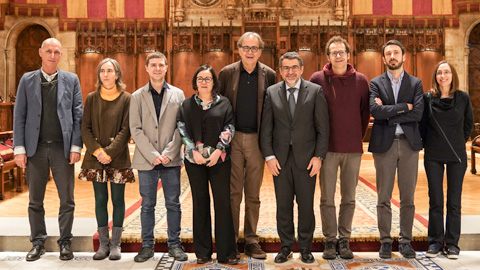"NewMob" project on new electrical and shared means of transport, selected by the BarcelonaCiència programme

10/02/2020
Last Friday, the list of seven research projects selected for the Barcelona Ciència Programme, with a total funding of one million euros, were made public. The aid forms part of the lines of action set down by the agreement between the city council and ”la Caixa” in January 2019 with the aim of fostering the city's research ecosystem and bring science closer to citizens. Of the total funding, the Barcelona City Council provides 600,000 Euros, 100,000 of which goes to managing and evaluating the initiative, and ”la Caixa” provides 400,000 Euros.
The research sectors included in the programme are ageing and quality of life, and mobility and environmental respect and protection, both related to the development of a sustainable evolution of the city, with a focus on current and future public policies. One of the programme's objectives is precisely to achieve that this research funding return to citizens by means of future municipal actions based on the scientific evidence generated by these research projects.
Scientific communitty aids is one of the two areas of action of the Barcelona Ciència Programme created by ”la Caixa” and the Barcelona City Council. The other area corresponds to the Barcelona “la Caixa”- Living Lab project, a citizen innovation platform that will become a meeting point for civil society and research institutes, and which will receive 600,000 Euros in funding from ”la Caixa”.
In this first call of the year 2020, a total of 57 research projects with local and metropolitan approaches applied to participate, through a variety of resarch centres, hospitals, universities and provate entities. After being evaluated by a committee of experts, seven projects were chosen, four corresponding to ageing and quality of life, and three corresponding to the area of mobility and envrionmental respect and protection.
The selected projects are all led by a research centre collaborating with three or more other entities, with a total of 21 entities participating. The duration of the research project is 18 months.
NewMob: Towards a new sustainable and healthy urban mobility
Led by UAB Department of Geography lecturer Carme Miralles-Guasch, NewMob analyses the impact of new electric and shared means of transport on the social and environmental environment in Barcelona, as well as on the health of its citizens.
In recent years, the use of scooters, bicycles and electric motorbikes, both personal and shared, have transformed the urban scenery. NEWMOB analyses the impact of today's mobility in Barcelona through a multimethodological approach which includes personalised surveys to over 900 users as well as a five-day monitoring of 150 people who are daily users of these vehicles. The objective is to study their use, understand user profiles, as well as pinpoint the environmental, social and health impacts these new mobility models have on the city of Barcelona. The results of this research are sure to contribute to an improvement in the regulation and optimisation of the city's mobility management.
MosquitoAlertBCN: Smart control of disease-tranmitting mosquitos
Led by CREAF (Centre de Recerca Ecològica i Aplicacions Forestals), located at the UAB campus, MosquitoAlertBCN is a citizen science project incorporating smart tech tools to monitor urban mosquitos and prevent potentially dangerous infectious diseases.
Gobalisation and climate change are causing invasive mosquito species to extend across Europe. Some of them, such as the tiger mosquito, can transmit diseases such as dengue fever, zika and chikungunya, among many other dangerous diseases. An early detection of these insects is fundamental for the prevention of epidemic outbreaks. MosquitoAlertBCN is a new complementary action to Mosquito Alert, a citizen platform that gathers information on invasive mosquito species, transmitters of diseases, through smartphones in order to monitor, control and create a map of areas of risk. This project includes new smart, online, technological tools that will allow to catch the mosquitos, quantify their populations and localise them, with levels of resolution and precision never before seen in the city. The study will give way to the identification of "hot spots", anticipate possible epidemic outbreaks and create an urban mosquito management model that can be shared with other European cities.